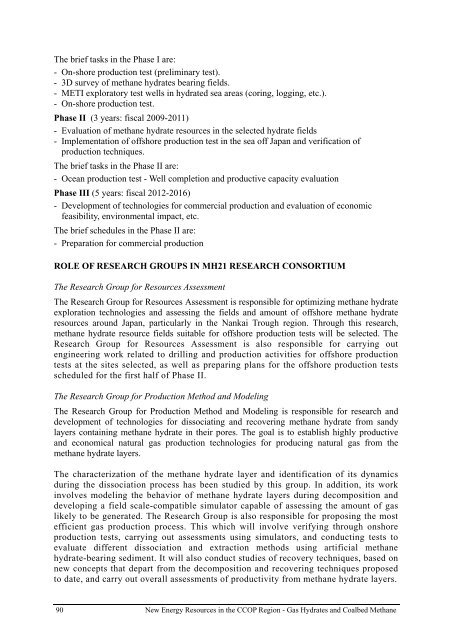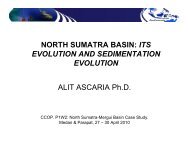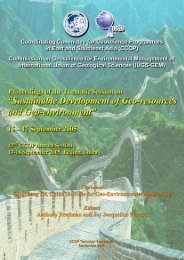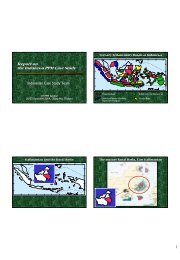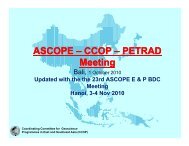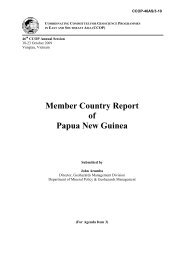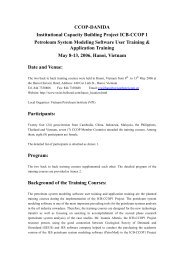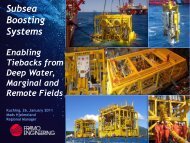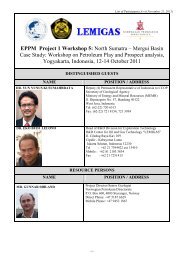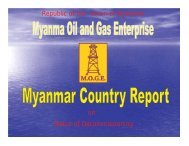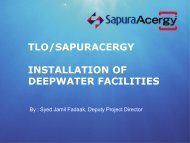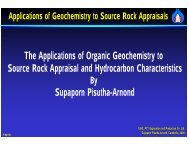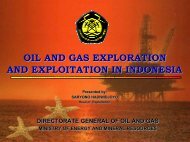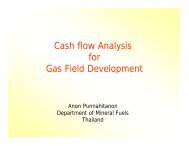Create successful ePaper yourself
Turn your PDF publications into a flip-book with our unique Google optimized e-Paper software.
The brief tasks in the Phase I are:<br />
- On-shore production test (preliminary test).<br />
- 3D survey of methane <strong>hydrate</strong>s bearing fields.<br />
- METI exploratory test wells in <strong>hydrate</strong>d sea areas (coring, logging, etc.).<br />
- On-shore production test.<br />
Phase II (3 years: fiscal 2009-2011)<br />
- Evaluation of methane <strong>hydrate</strong> resources in the selected <strong>hydrate</strong> fields<br />
- Implementation of offshore production test in the sea off Japan and verification of<br />
production techniques.<br />
The brief tasks in the Phase II are:<br />
- Ocean production test - Well completion and productive capacity evaluation<br />
Phase III (5 years: fiscal 2012-2016)<br />
- Development of technologies for commercial production and evaluation of economic<br />
feasibility, environmental impact, etc.<br />
The brief schedules in the Phase II are:<br />
- Preparation for commercial production<br />
ROLE OF RESEARCH GROUPS IN MH21 RESEARCH CONSORTIUM<br />
The Research Group for Resources Assessment<br />
The Research Group for Resources Assessment is responsible for optimizing methane <strong>hydrate</strong><br />
exploration technologies and assessing the fields and amount of offshore methane <strong>hydrate</strong><br />
resources around Japan, particularly in the Nankai Trough region. Through this research,<br />
methane <strong>hydrate</strong> resource fields suitable for offshore production tests will be selected. The<br />
Research Group for Resources Assessment is also responsible for carrying out<br />
engineering work related to drilling and production activities for offshore production<br />
tests at the sites selected, as well as preparing plans for the offshore production tests<br />
scheduled for the first half of Phase II.<br />
The Research Group for Production Method and Modeling<br />
The Research Group for Production Method and Modeling is responsible for research and<br />
development of technologies for dissociating and recovering methane <strong>hydrate</strong> from sandy<br />
layers containing methane <strong>hydrate</strong> in their pores. The goal is to establish highly productive<br />
and economical natural <strong>gas</strong> production technologies for producing natural <strong>gas</strong> from the<br />
methane <strong>hydrate</strong> layers.<br />
The characterization of the methane <strong>hydrate</strong> layer and identification of its dynamics<br />
during the dissociation process has been studied by this group. In addition, its work<br />
involves modeling the behavior of methane <strong>hydrate</strong> layers during decomposition and<br />
developing a field scale-compatible simulator capable of assessing the amount of <strong>gas</strong><br />
likely to be generated. The Research Group is also responsible for proposing the most<br />
efficient <strong>gas</strong> production process. This which will involve verifying through onshore<br />
production tests, carrying out assessments using simulators, and conducting tests to<br />
evaluate different dissociation and extraction methods using artificial methane<br />
<strong>hydrate</strong>-bearing sediment. It will also conduct studies of recovery techniques, based on<br />
new concepts that depart from the decomposition and recovering techniques proposed<br />
to date, and carry out overall assessments of productivity from methane <strong>hydrate</strong> layers.<br />
90<br />
New Energy Resources in the <strong>CCOP</strong> Region - Gas Hydrates and Coalbed Methane


